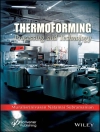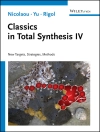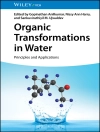Comprehensive and up-to-date, this book focuses on the latest advances in the field, such as newly developed techniques, more environmentally benign processes, broadened scopes, and completely novel MCRs. In addition to carbene-promoted MCRs and frequently applied metal-catalyzed MCRs, it also covers recently developed catalytic enantioselective variants as well as MCR in drug discovery and for the synthesis of heterocyclic molecules and macrocycles.
Edited by the leading experts and with a list of authors reading like a ‘who’s who’ in multicomponent reaction chemistry, this is definitely a must-have for every synthetic organic chemist as well as medicinal chemists working in academia and pharmaceutical companies.
Daftar Isi
Preface
GENERAL INTRODUCTION TO MCRs: PAST, PRESENT, AND FUTURE
Introduction
Advances in Chemistry
Total Synthesis
Applications in Pharmaceutical and Agrochemical Industry
Materials
Outlook
DISCOVERY OF MCRs
General Introduction
The Concept
The Reaction Design Concept
Multicomponent Reactions and Biocatalysis
Multicomponent Reactions in Green Pharmaceutical Production
Conclusions
ARYNE-BASED MULTICOMPONENT REACTIONS
Introduction
Multicomponent Reactions of Arynes via Electrophilic Coupling
Transition Metal-Catalyzed Multicomponent Reactions of Arynes
Concluding Remarks
UGI-SMILES AND PASSERINI-SMILES COUPLINGS
Introduction
Scope and Limitations
Ugi-Smiles Postcondensations
Conclusions
1, 3-DICARBONYLS IN MULTICOMPONENT REACTIONS
Introduction
Achiral and Racemic MCRs
Enantioselective MCRs
Conclusions and Outlook
FUNCTIONALIZATION OF HETEROCYCLES BY MCRs
Introduction
Mannich-Type Reactions and Related Processes
Beta-Dicarbonyl Chemistry
Hetero-Diels-Alder Cycloadditions and Related Processes
Metal-Mediated Processes
Isocyanide-Based Reactions
Dipole-Mediated Processes
Conclusions
DIAZOACETATE AND RELATED METAL-STABILIZED CARBENE SPECIES IN MCRs
Introduction
MCRs via Carbonyl or Azomethine Ylide-Involved 1, 3-Dipolar Cycloadditions
MCRs via Electrophilic Trapping of Protic Onium Ylides
MCRs via Electrophilic Trapping of Zwitterionic Intermediates
MCRs via Metal Carbene Migratory Insertion
Summary and Outlook
METAL-CATALYZED MULTICOMPONENT SYNTHESIS OF HETEROCYCLES
Introduction
Multicomponent Cross-Coupling and Carbonylation Reactions
Metallacycles in Multicomponent Reactions
Multicomponent Reactions via 1, 3-Dipolar Cycloaddition
Concluding Remarks
MACROCYCLES FROM MULTICOMPONENT REACTIONS
Introduction
IMCR-Based Macrocyclizations of Single Bifunctional Building Blocks
Multiple MCR-Based Macrocyclizations of Bifunctional Building Blocks
IMCR-Based Macrocyclizations of Trifunctionalized Building Blocks (Mi B-3D)
Sequential IMCR-Based Macrocyclizations of Multiple Bifunctional Building Blocks
Final Remarks and Future Perpectives
MULTICOMPONENT REACTIONS UNDER OXIDATIVE CONDITIONS
Introduction
Multicomponent Reactions Involving In-Situ Oxidation of One Substrate
Multicomponent Reactions Involving Oxidation of a Reaction Intermediate
Multicomponent Reactions Involving Oxidants as Lewis Acids
Conclusions
ALLENES IN MULTICOMPONENT SYNTHESIS OF HETEROCYCLES
Introduction
Reactions with 1, 2-Propadiene and Unactivated Allenes
Reactions with Acceptor-Substituted Allenes
Reactions with Donor-Substituted Allenes
Conclusions
ALKYNES IN MULTICOMPONENT SYNTHESIS OF HETEROCYCLES
Introduction
Sigma-Nucleophilic Reactivity of Alkynes
Pi-Nucleophilic Reactivity of Alkynes
Alkynes as Electrophilic Partners
Alkynes in Cycloadditions
Alkynes as Reaction Partners in Organometallic MCRs
Conclusions
ANHYDRIDE-BASED MULTICOMPONENT REACTIONS
Introduction
Quinolones and Related Heterocylces from Homophthalic and Isatoic Anhydrides
Alpha, Beta-Unsaturated Cyclic Anhydrides: MCRs Involving Conjugate Addition and Cycloaddition Reactions
MCRs of Cyclic Anhydrides in Annulation Reactions and Related Processes
MRCs of Acyclic Anhydrides
Conclusions
FREE-RADICAL MULTICOMPONENT PROCESSES
Introduction
MCRs Involving Addition Across Olefin C=C Bonds
Free-Radical Carbonylation
Free-Radical Oxygenation
MCRs Involving Addition Across Pi-C=N Bonds
Miscellaneous Free-Radical Multicomponent Reactions
Conclusions
CHIRAL PHOSPHORIC ACID-CATALYZED ASYMMETRIC MULTICOMPONENT REACTIONS
Introduction
Mannich Reaction
Ugi-Type Reaction
Biginelli Reaction
Aza-Diels-Alder Reaction
1, 3-Dipolar Cycloaddition
Hantzsch Dihydropyridine Synthesis
The Combination of Metal and Chiral Phosphoric Acid for Multicomponent Reaction
Other Phosphoric Acid-Catalyzed Multicomponent Reactions
Summary
Index
Tentang Penulis
Jieping Zhu received his BSc degree from Hanzhou Normal University (P.R. China) and his MSc degree from Lanzhou University (P.R. China) under the guidance of Prof. Y.-L. Li. He obtained his Ph D from the Université Paris XI, France, under the supervision of Prof. H.-P. Husson and Prof. J. C. Quirion. After 18 months post-doctoral research with Prof. Sir D. H. R. Barton at Texas A&M University in USA, he joined the Institut de Chimie des Substances Naturelles (CNRS, France) as Chargé de Recherche and was promoted to Director of Research 2nd class in 2000 and then 1st class in 2006. He moved to Swiss Federal Institute of Technology Lausanne (EPFL), Switzerland, in 2010 as a full professor. His main research interests center on the development of novel synthetic methods, their application in the synthesis of bioactive natural products, and the design of novel multicomponent reactions. He has published over 220 research articles and the well-received book ‘Multicomponenet Reactions’ (Wiley-VCH, 2005).
Qian Wang received her BSc and MSc degree from Lanzhou University (P.R. China) under the guidance of Prof. Y. Li. She obtained her Ph D degree from Chinese University of Hong Kong under the supervision of Prof. H.N.C. Wong. After several post-doctoral stays in Switzerland and in France, she joined the Institut de Chimie des Substances Naturelles (CNRS, France) as a research engineer. In 2010, she moved to Swiss Federal Institute of Technology Lausanne (EPFL), Switzerland, as a research scientist.
Mei-Xiang Wang received a BSc degree in chemistry from Fudan University, Shanghai. After spending three years at the General Research Institute of Non-ferrous Metals (GRINM, Beijing) as a research associate, he joined the Institute of Chemistry, Chinese Academy of Sciences (ICCAS) at Beijing as a research student. He obtained his master degree and Ph D in 1989 and 1992, respectively under the supervision of Prof. Z.-T. Huang. In the next 17 years, he worked at ICCAS ranking from assistant professor, associate professor to professor. During 2000 to 2004, he served as the Director of ICCAS and Center for Molecular Science, Chinese Academy of Sciences. Since May 2009, he has been a professor of chemistry at Tsinghua University in Beijing. He has published over 150 research articles and his research interests include enantioselective biotransformations using whole cell catalysts and selective organic reactions for the synthesis of natural products and bioactive compounds.











